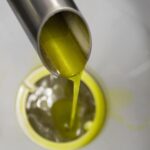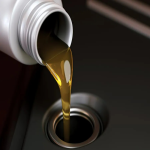
What is Gear Oil?: Uses, Types, Applications & Price Factors
It is a specialized lubricant designed specifically for use in gear systems to reduce friction, prevent wear, and ensure smooth power transmission. It plays a critical role in both industrial machinery and automotive applications, especially where high pressure and load-carrying capacity are required. Peak Universal Business supplies high-quality Gear Oil tailored to meet the specific needs of different industrial and automotive applications. This blog explores the various aspects of gear oil, including its uses, types, applications, advantages, disadvantages, and future prospects.
What Makes Gear Oil Different from Engine Oil?
Unlike engine oil, gear oil:
-
Has higher viscosity for better film strength
-
Contains Extreme Pressure (EP) additives
-
Is designed to handle sliding contacts and shock loading in gear teeth
-
Often includes anti-wear, anti-foam, and corrosion inhibitors
Key Properties of Gear Oil
| Property | Importance |
|---|---|
| High Viscosity | Maintains film between gear teeth under pressure |
| EP Additives | Protects surfaces under heavy loads |
| Thermal Stability | Resists breakdown at high temperatures |
| Anti-Wear Properties | Reduces gear and bearing wear |
| Water Tolerance | Prevents emulsification and corrosion |
Key Characteristics
High Viscosity:
It has a higher viscosity compared to engine oil, providing a thicker lubricating film that helps protect gears from wear and tear.
Extreme Pressure (EP) Additives:
These additives form a protective film on gear surfaces, preventing metal-to-metal contact and reducing wear under high-pressure conditions.
Anti-Foaming Agents:
Its contains anti-foaming agents to prevent the formation of foam, which can reduce the effectiveness of lubrication.
Corrosion and Rust Inhibitors:
These additives protect gear surfaces from corrosion and rust, extending the life of the gear system.
Oxidation Resistance:
They are formulated to resist oxidation, which can cause oil thickening and the formation of sludge and varnish.
Gear Oil Types
Gear oils are classified by viscosity and performance, typically according to:
1. API GL Ratings (Automotive Use)
| API Grade | Application |
|---|---|
| GL-1 | Light-duty, no EP additives |
| GL-4 | Moderate load, common in manual gearboxes |
| GL-5 | High load, used in hypoid gears (differentials) |
2. ISO VG Grades (Industrial Use)
Industrial gear oils follow ISO viscosity grades like ISO VG 68, 100, 150, 220, 320, etc., selected based on machinery requirements.
Types:
They come in various types and formulations, each designed to meet specific performance requirements.
1. Mineral
Mineral Gear Oil is derived from refined crude oil and is the most common type of gear oil. It is suitable for a wide range of applications and is typically more affordable than synthetic alternatives. However, it may not perform as well under extreme conditions.
2. Synthetic
Synthetic gear oil is formulated using chemically synthesized base oils, offering superior performance compared to mineral oil. It provides better protection at high and low temperatures, improved oxidation resistance, and longer service life. Synthetic gear oil is often used in high-performance and heavy-duty applications.
3. Semi-Synthetic
Semi-synthetic Gear Oil, also known as synthetic blend gear oil, combines mineral oil with synthetic base oils. It offers improved performance over mineral oil while being more cost-effective than fully synthetic gear oil. Semi-synthetic gear oil is a good compromise for many applications.
4. Hypoid
Hypoid Gear Oil is specifically formulated for hypoid gears, which are commonly found in automotive differentials. Hypoid gears operate under high pressure and sliding motion, requiring gear oil with extreme pressure (EP) additives to prevent wear and ensure smooth operation.
5. Multi-Grade
Multi-grade gear oil is designed to perform well over a wide temperature range. It provides consistent lubrication in both cold and hot conditions, making it suitable for use in various climates and applications.
Base Oils Used in Gear Oils
Gear oils can be made from different base stocks:
-
🟢 Mineral Base Oils – SN 150, SN 500, SN 650
-
🔵 Synthetic Base Oils – PAO, ester-based, or semi-synthetic
-
🟠 Bio-Based Oils – For environmentally sensitive applications
Its used in a wide range of applications where the lubrication of gears is critical. These applications include:
Automotive Transmissions:
Its used in manual and automatic transmissions to ensure smooth shifting and protect gears from wear.
Differentials:
It lubricates the gears and bearings within differentials, ensuring efficient power transfer and reducing noise and vibration.
Transfer Cases:
In four-wheel-drive and all-wheel-drive vehicles, they lubricates the transfer case gears, facilitating power distribution to the axles.
Industrial Gearboxes:
Its used in industrial machinery and equipment to lubricate gearboxes, reducing friction and wear and ensuring reliable operation.
Marine Equipment:
Its used in the gear systems of marine engines and equipment to protect against the harsh marine environment.
Common Applications:
Gear oils are essential in:
-
🚛 Automotive differentials and gearboxes
-
⚙️ Industrial gear drives and reducers
-
⛽ Oil and gas equipment
-
🏭 Heavy-duty manufacturing machinery
-
🚜 Construction and agricultural vehicles
It is used in a variety of applications to ensure the smooth and efficient operation of gear systems. Key applications include:
1. Automotive Applications
Manual Transmissions:
Gear oil lubricates the gears, synchronizers, and bearings in manual transmissions, ensuring smooth shifting and reducing wear.
Automatic Transmissions:
Specially formulated gear oil for automatic transmissions provides lubrication, cooling, and hydraulic pressure for smooth operation.
Differentials:
Gear oil in differentials reduces friction and wear on gears and bearings, ensuring efficient power transfer and reducing noise.
Transfer Cases:
Gear oil in transfer cases lubricates the gears and ensures reliable power distribution to the axles in four-wheel-drive and all-wheel-drive vehicles.
2. Industrial Applications
Gearboxes:
Gear oil lubricates the gears and bearings in industrial gearboxes, reducing friction and wear and ensuring reliable operation.
Machinery and Equipment:
Its used in various types of industrial machinery and equipment, including conveyor systems, mixers, and crushers, to ensure smooth operation and reduce maintenance costs.
3. Marine Applications
Marine Engines:
Gear oil in marine engines lubricates the gears and bearings, protecting them from the harsh marine environment and ensuring reliable operation.
Marine Equipment:
Its used in various types of marine equipment, including winches, thrusters, and steering systems, to ensure smooth and efficient operation.
Gear Oil Price Factors:
Several factors influence the price of gear oil, including:
Raw Material Costs:
The cost of base oils and additives used in the formulation of gear oil can impact the final price. High-quality synthetic base oils and advanced additives typically cost more than standard mineral oils.
Manufacturing Costs:
The complexity of the manufacturing process, including blending and quality control, can affect the cost of it.
Market Demand:
High demand for specialized gear oils, such as those used in high-performance or industrial applications, can drive up prices.
Distribution and Logistics:
The cost of packaging, transportation, and storage can also influence the final price of it.
Regulatory Compliance:
Compliance with environmental and safety regulations can add to the cost of producing gear oil, especially for formulations that require advanced testing and certification.
Why Choose Peak Universal Business as Your Supplier?
Peak Universal Business is a leading supplier of high-quality products, offering a wide range of products tailored to meet the specific needs of various applications. Here are some reasons to choose Peak Universal Business as your gear oil supplier:
Quality Assurance:
We adhere to stringent quality control measures to ensure that our gear oils meet the highest standards of performance and reliability.
Technical Expertise:
Our team of experts provides technical support and guidance to help you select the right product for your specific application.
Customized Solutions:
We offer tailored solutions to meet your unique requirements, including custom formulations and packaging options.
Sustainability Commitment:
We prioritize sustainability in our production processes, offering environmentally friendly gear oils that minimize environmental impact.
Competitive Pricing:
We offer competitive pricing without compromising on quality, providing you with the best value for your investment.
Why Choosing the Right Oil Matters
Using the wrong gear oil can lead to:
-
Increased wear and tear
-
Overheating
-
Corrosion
-
Premature equipment failure
Choosing the correct viscosity grade and additive package ensures optimal performance, protection, and longevity of your equipment.
📌 Frequently Asked Questions (FAQs)
❓ What is gear oil used for?
Gear oil is used to lubricate and protect gear systems in vehicles, industrial machines, and heavy equipment. It reduces friction, prevents metal-to-metal contact, and extends the lifespan of gears under high pressure and heat.
❓ What is the difference between gear oil and engine oil?
Gear oil is:
-
Thicker (higher viscosity)
-
Contains EP (Extreme Pressure) additives
-
Designed for sliding gear contacts, not combustion systems
-
Operates under higher pressure rather than high-speed shearing
❓ What do the GL-4 and GL-5 ratings mean?
These are API classifications:
-
GL-4: Suitable for moderate loads (e.g., manual transmissions)
-
GL-5: Contains more EP additives; ideal for high-load gears like hypoid differentials
Using the wrong grade can damage synchronizers or cause gear pitting.
❓ Can I use gear oil in a transmission?
Yes—manual transmissions often require gear oil (usually GL-4).
Automatic transmissions, however, need special ATF fluids and not standard gear oils.
❓ What viscosity is best for gear oil?
It depends on the application:
-
Automotive: SAE 75W-90, 80W-90, or 85W-140
-
Industrial: ISO VG 150, 220, 320, etc.
Check your equipment’s OEM recommendations.
❓ What is EP (Extreme Pressure) additive in gear oil?
EP additives help gear oil handle high load conditions by creating a protective film on gear surfaces. This prevents scoring, pitting, and premature wear—especially in hypoid gears.
❓Is synthetic gear oil better?
Synthetic oils offer:
-
Better oxidation resistance
-
Wider temperature range
-
Longer service life
They’re ideal for extreme weather or high-performance equipment, but cost more than mineral oils.
❓ How often should gear oil be changed?
Change intervals depend on:
-
Usage conditions (load, speed, contamination)
-
Manufacturer specs
Typically:
-
Automotive gear oil: 30,000–60,000 km
-
Industrial gearboxes: every 6–12 months
Always monitor oil condition and schedule regular maintenance.
✅ Conclusion- What is Gear Oil?
Gear Oil plays a critical role in ensuring the smooth and efficient operation of gear systems in a wide range of applications. From automotive transmissions to industrial gearboxes, gear oil provides essential lubrication, protection, and performance benefits.
Understanding the different types(Mineral, Synthetic, Semi-synthetic, Hypoid, Multi-grade) , their uses, advantages, and disadvantages, as well as future trends and price factors, can help you make informed decisions when selecting the right product for your needs.
Peak Universal Business is your trusted partner for high-quality products, offering superior products and expert support to meet your lubrication needs. Contact us today to learn more about our products offerings and how we can help you achieve optimal performance and reliability in your gear systems.
You can Read More about Our products Here:
What is Paraffin Wax and its Features, Uses & Application
Preparation of Standard Rubber Processing oil & Its Applications
Recycled Base Oil SN 500 Distilled
What is Paraffin Wax and its Features, Uses & Applications
Preparation of Standard Rubber Processing oil & Its Applications
Recycled Base Oil SN 500 Distilled
Base Oil SN 650
Base Oil SN 500
What are the 3 Types of Base Oil?
📣 Call to Peak Universal Business
📞Get the Right Oil for Your Needs
🔍 Need high-quality automotive or industrial gear oils?
Peak Universal Business supplies:
-
✅ SN-based gear oil formulations
-
✅ Industrial ISO VG grades
-
✅ Custom blending for EP and anti-wear performance
-
✅ Bulk or drum delivery worldwide
👉 Contact Us Today to get technical specifications or a custom quote.
🛒 Request a Quote Today
📧 Email: [email protected]
📞 Phone: +971 4 878 2031
Get in touch today to speak with our experts, request a technical data sheet, or receive a custom quote for Oil tailored to project. PUBLtd as your Oil Provider. If You have any other Query or Question you want to ask, Please don’t hesitate to Contact Us.
- 0 comment





Leave a Reply